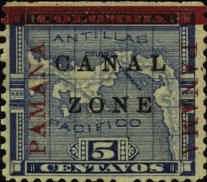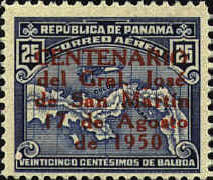|
The Panama Canal
In 1878 the Columbian
government awarded a contract to build a canal across the isthmus to
Lucien Wyse. Wyse sold the concession to the French diplomat Ferdinand
de Lesseps whose plan to build a sea-level canal was a colossal
disaster. In 1903, the United States, under Theodore Roosevelt, tried
to buy the concession but Columbia refused. When a revolutionary group
in Panama - then a province of Columbia - declared independence, the
US supported the new government and sent battleships to protect them
from Columbian troops, and quickly signed a treaty with Panama’s new
leaders that awarded the United States "sovereign rights in perpetuity
over the Canal Zone." Construction began almost immediately and the
first ship sailed through on August 15, 1914. A new treaty was finally
negotiated in 1977 that arranged for Panama to take possession of the
canal on December 31, 1999.
In 1887
Columbia issued two designs for stamps of various denominatons with
the map of the Isthmus of Panama for the Department of Panama.


(Columbian State of Panama 15).
Six years later Panama gained its independence from Columbia, and the
stamp was reissued overprinted in red with a bar covering “Columbia”
at the top and with “PANAMA” vertically on both sides of the stamp
(Panama 78). In 1904 the overprinted stamps were further overprinted
“CANAL ZONE” (Canal Zone 12). The specimen displayed shows an error in
the “PANAMA” on the left side of the stamp printed as PAMANA.

The following stamp shows
the course of the Canal through the Isthmus of Panama. It was issued
in 1915.

The stamps of the Republic of
Panama were issued in 1930 and 1950.


The
Salvadoran stamp was issued in 1924. The Cuban stamp was issued in
1914. The dotted lines on the Cuban stamp indicate sea routes to the
Canal.


During the construction of
the Canal in 1914 an island, Barro Colorado, was formed when the
Chagres River was dammed and Lake Gatun was formed.
In 1923 one of the first biological reserves in the
Western Hemisphere was established on the island. At the research
station scientists were able to study, observe and experiment in ideal
surroundings. Since 1927, the island, known as the Canal Zone
Biological Area, has been operated by the Smithsonian Institution.
In 1966 the name was changed to the Smithsonian
Tropical Research Institute, and its range of study was increased to
include animal behavior, plant ecology, canopy biology, paleoecology,
archaeology, evolution, genetics, marine ecology, anthropology and
conservation science. The stamp, issued in 1948 for the 25th
anniversary of the Canal Zone Biological Area, displays an outline map
of the island, and a Coati Mundi, a 10 to 20 pound animal whose
habitat is the mountains, forests, rocky wooded canyons, desert
canyons and open forests.

The
Roosevelt Medal was issued as a result of an Executive Order dated
June 23, 1907, by President Theodore Roosevelt. It recognizes service
by American citizens on the Canal project who completed at least 2
years of satisfactory continuous service with the Canal construction
force, including the Panama Railroad Company between May 4, 1904 and
December 31, 1914. Both sides of the medal are shown. The map on the
stamp shows the Canal Zone.


 |
